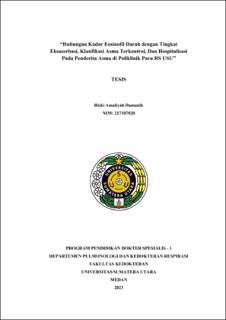| dc.description.abstract | Introduction: Asthma is a heterogeneous disease with chronic airway inflammation characterized
by symptoms like wheezing, shortness of breath, and coughing. Eosinophil infiltration
distinguishes it from other airway inflammatory disorders, primarily triggered by allergen
inhalation
Objectives: To understand the relationship between blood eosinophil levels with exacerbation
levels, shortness of breath levels, and hospitalization event in Asthma patients at the USU
Hospital’s pulmonary polyclinic
Methdos: Analytical observational research with a retrospective cohort approach and Mann-
Whitney test to see the relationship between blood eosinophil levels with exacerbation levels,
degree of shortness of breath, and hospitalization event in asthma patients. Samples are All
outpatients with asthma aged over 18 years received ICS-LABA therapy and underwent peripheral
blood eosinophil examinations at the USU Hospital’s pulmonary clinic for the period June–October
2023.
Results: We received a total of 25 samples, the majority of which were female (80%), with
eosinophil levels <100 (84%), patients never hospitalized (72%), and an age range of 26–50 years
(44%). There was no correlation between eosinophil levels and exacerbation levels, shortness of
breath levels, or hospitalization event among asthma patients at the USU Hospital pulmonary clinic.
Conclusions: the rate of exacerbation, the degree of shortness of breath and hospitalization in
asthma patients were not exclusively influenced by eosinophil levels. So, more research is needed
on a number of other factors. | en_US |


